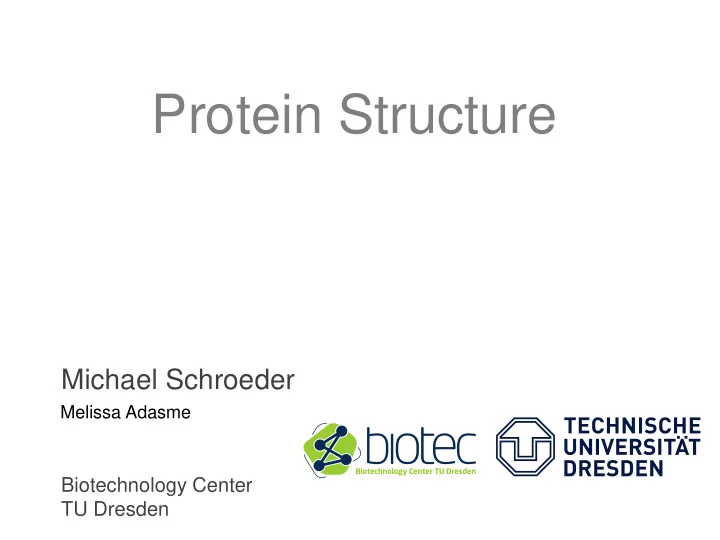

Protein Structure Michael Schroeder Joachim Haupt Melissa Adasme Biotechnology Center TU Dresden
Hierarchical structure of proteins Heim et al. Chemical Society Reviews, 2010 2
wwpdb.org 3
Gorbi.irb.hr 4
Actinidin and Papain 50% sequence ID, same structure 5
Hemoglobin and Leghemoglobin 11% sequence ID, same structure 6
Same family Same superfamily, but not family Twilight zone 7
Structure prediction Secondary structure prediction Homology modelling Ab initio prediction Rosetta Evfold 8
Structure prediction 9 David Jones, UCL, 1997
Structure prediction Ramachandran plot 10
Rosetta 11
Rosetta 12
EVfold Structure Prediction from Multiple Sequence Alignments 13 Marks et al., PLoS One , 2011 13
Evfold Direct Information Statistical Model 14 Marks et al., PLoS One , 2011 14
EVfold Examples 15 Marks et al., PLoS One , 2011 15
16
SCOP : S tructural C lassification o f P roteins top CLASS All alpha All Beta Alpha+Beta Alpha/Beta FOLD Trypsin-like serine proteases Immunoglobulin-like SUPERFAMILY Distant common ancestor Low sequence similarity Transglutaminase Immunoglobulin FAMILY Closer evolutionary relationship C1 set domains V set domains >30 sequence identity (antibody constant) (antibody variable) 17
All alpha All beta 18
Alpha and beta Alpha plus beta 19
Membrane proteins Aquaporin 1ih5 20
Hou et al. PNAS, 2003 21
Structure Alignment 22
23
G proteins (P-loop) Conformational change on GTP or GDP binding 24
Citrate Synthase 1cts, 5cts 25
Lactoferrin iron-binding protein in secretions such as milk or tears Rotation of 54º upon iron-binding 1lfh,1lfg 26
Dynamic programming for structure alignment Sequence a and b Score for a i and b j = 1 / distance d(a i , b j ) No gap penalties 27
Double Dynamic programming for structure alignment For all pairs a i and b j: Superpose a i and b j Dynamic programming of previous slide Add best aligned residues to overall alignment Double dynamic programming is basis of SSAP used for CATH 28
Scoring a structural alignment Sequences: matching residues Structure: root mean square deviation (RMSD) 29
RMSD: Root Mean Square Deviation Distance of points a = (a x ,a y ) and b=(b x , b y )? a b 30
RMSD: Root Mean Square Deviation RMSD=average distance of aligned atoms Given the distances δ i between n aligned atoms, the RMSD is defined as: 31
Quality of alignment RMSD is measured in Ångstrom (Å) 1 Å = 0.1 nm RMSD = 0 Å: Identical structures RMSD < 3 Å: Similar structures 32
Pitfalls of RMSD RMSD is size dependent All atoms treated equally (e.g. core residues less flexible than surface residues) Best alignment not always minimal RMSD 33
Large complexes 34
GroEL/GroES 35
Modelling large complexes: Set1 Tuukkanen et al. Proteomics, 2010 36
What is a domain? 37
What is a domain? Functional : independent unit Physiochemical : hydrophobic core Topological : Intra-domain distances of atoms are minimal, Inter-domain distances maximal 38
Domains are independent units 1in5 1a5t P-loop (green/orange) P-loop domain (green & orange) Winged helix DNA binding domain DNA polymerase III domain 39
Domains have hydrophobic core Kyte & Doolittle, JMB, 1982 By Michael Schroeder, Biotec, 40
Intra-domain distances minimal Distances between atoms within domain are minimal Distances between atoms of two different domains are maximal By Michael Schroeder, Biotec, 41
Motifs 42
Interface helices: L-x-S-I-[GP] Glutamate symporter Serine protease Cytochrome bc1 1kb9 2ic8 2nwl Marsico et al. BMC Bioinf., 2010 43
Protein interactions 44
Families and Interfaces One family pair = one interface? No, 40% of families have alternative binding modes One interface = one family? 10% of interfaces have more than one interactor Kim et al., PLoS CB, 2006 45
Two domains, many interface Long chained cytokine (center) and fibronectin type III domains (peripheral) Kim et al., PLoS CB, 2006 46
One interface, many families Subtilisin/Chymotrypsin. Catalytic triad (Asp, His, Ser) in pink 47
Viral mimicry of native interfaces 48
Baculovirus p35 mimics human protein Viral p35 Human Caspase + = Human IAP By Human Mic Caspase hae l Sch roe der, Biot 49 Henschel et al., Bioinformatics 2006 ec
One interface, many families Henschel, et al. Bioinf., 2006 Caspase 3, Inhibitor of Apoptosis (green), and Baculovirus p35 (yellow) 50
HIV Nef mimics human protein HIV NEF Human SH3 + = Human Human SH3 Henschel et al., Bioinformatics 2006 51
HIV Nef mimics native PxxP motif Virus Human Nef Kinase 52 Henschel et al., Bioinformatics 2006
HIV capsid mimics human protein HIV capsid Human Cyclophilin + = Human Cyclophilin Human Cyclophilin 53 Henschel et al., Bioinformatics 2006
Drug repositioning 54
One interface, many families 55
Heinrich et al. J Cancer Res clin Onc, 2011 56
57
Recommend
More recommend